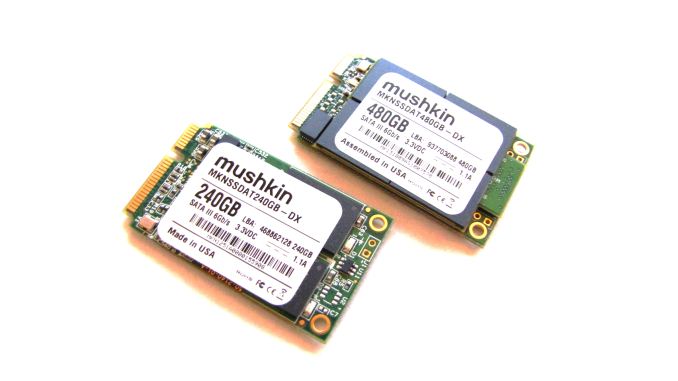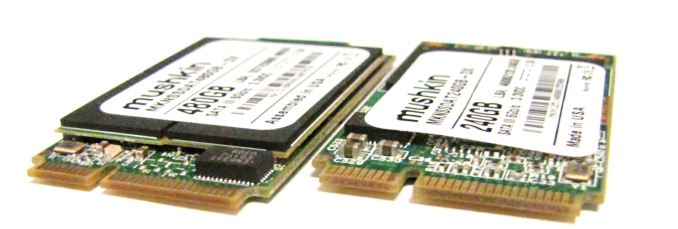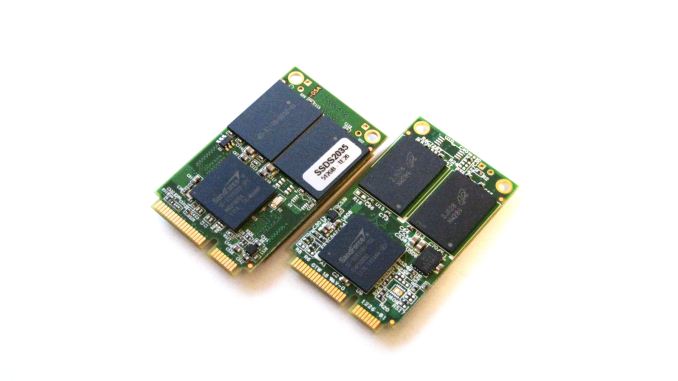Mushkin Atlas mSATA (240GB & 480GB) Review
by Kristian Vättö on December 16, 2013 1:10 PM EST
The retail mSATA SSD market doesn't have too many players. Most OEMs, such as Samsung (although that is about to change), Toshiba and SanDisk, only sell their mSATA SSDs straight to PC OEMs. Out of the big guys, only Intel and Crucial/Micron are in the retail game but fortunately there are a few smaller OEMs that sell retail mSATA SSDs as well. One of them is Mushkin and today we'll be looking at their Atlas lineup.
Mushkin sent us two capacities: 240GB and 480GB. Typically 240GB has been the maximum capacity for mSATA SSDs due to the fact that there's room for only four NAND packages and with 64Gbit per NAND die the maximum capacity for each package comes in at 64GB (8x8GB), which yeilds a total NAND capacity of 256GB. Crucial and Samsung have mSATA SSDs of up to 512GB (Samsung offers up to 1TB now) thanks to their 128Gbit NAND but currently neither Samsung nor Micron is selling their 128Gbit NAND to other OEMs (at least not in the volumes required for an SSD). I'm hearing that Micron's 128Gbit NAND will be available to OEMs early next year and many are already planning products based on it.
Since Mushkin is limited to 64Gbit NAND like other fab-less OEMs, they had to do something different to break the 256GB barrier. Since you can't get more than 64GB in a single NAND package, the only solution is to increase the amount of NAND packages in the SSD. Mushkin's approach is to use a separate daughterboard with four NAND packages that's stacked on top of the standard mSATA SSD. There are already four NAND packages in a regular mSATA SSD, so with four more the maximum NAND capacity doubles to 512GB. However, the actual usable capacity in Atlas is 480GB thanks to SandForce's RAISE and added over-provisioning.
The result is a slightly taller design than a regular mSATA SSD but the drive should still be compatible with all mSATA-equipped devices. Mushkin had to use specially packaged NAND in the 480GB model (LGA60 vs LBGA100 in the 240GB) to lower the height and guarantee compatibility. The NAND daughterboard seems to be glued to the main PCB and dislocating it would require a substantial amount of force. I tried to dislocate it gently with my hands but I couldn't, so I find it unlikely that the daughterboard would dislocate on its own while in use.
| Mushkin Atlas Specifications | |
| Capacities (GB) | 30, 40, 60, 120, 240, 480 |
| Controller | SandForce SF-2281 |
| Sequential Read | Up to 560MB/s |
| Sequential Write | Up to 530MB/s |
| 4KB Random Write | Up to 80K IOPS |
| Warranty | 3 years |
The Atlas is available in pretty much all capacities you can think of, starting from 30GB and going all the way up to 480GB. Mushkin gives the Atlas a three-year warranty, which is the standard for mainstream drives. The retail packaging doesn't include anything else but the drive but you don't really need any peripherals with an mSATA drive.
Here you can see the difference in NAND packages. The one on the left is the 480GB model and it's NAND packages cover slightly more area on the PCB but are also a hair thinner. Like many other OEMs, Mushkin buys their NAND in wafers and does packaging/validation on their own. Due to supplier agreements, Mushkin couldn't reveal the manufacturer but I'm guessing we're dealing with 20nm Micron NAND. So far I've only seen Micron and Toshiba selling NAND in wafers and as Mushkin has used Micron in the past (the 240GB sample is a bit older and uses Micron NAND), it would make sense.
Test System
| CPU | Intel Core i5-2500K running at 3.3GHz (Turbo and EIST enabled) |
| Motherboard | AsRock Z68 Pro3 |
| Chipset | Intel Z68 |
| Chipset Drivers | Intel 9.1.1.1015 + Intel RST 10.2 |
| Memory | G.Skill RipjawsX DDR3-1600 4 x 8GB (9-9-9-24) |
| Video Card |
XFX AMD Radeon HD 6850 XXX (800MHz core clock; 4.2GHz GDDR5 effective) |
| Video Drivers | AMD Catalyst 10.1 |
| Desktop Resolution | 1920 x 1080 |
| OS | Windows 7 x64 |
Thanks to G.Skill for the RipjawsX 32GB DDR3 DRAM kit












27 Comments
View All Comments
henrybravo - Monday, December 16, 2013 - link
Perhaps you should go back and read the 2 paragraphs in the power consumption section. They used an mSATA adapter with a voltage regulator, which caused the power consumption numbers to be artificially high. Kristian speculates the true power draw of the drive is actually comparable to the Intel SSD 525.whyso - Tuesday, December 17, 2013 - link
"Hence the numbers for mSATA drives are not accurate because the voltage regulator consumes some of the power." I was assuming they are using the same adapter for all the drives (which they say plural).Kristian Vättö - Tuesday, December 17, 2013 - link
The same adapter was used with Plextor M5M and MyDigitalSSD's SSDs. I'm currently trying to set it up so that the voltage/current going straight to the drive could be measured. Will update if I get it working...phantom505 - Monday, December 30, 2013 - link
Pretty poor reading comprehension. The voltage regulator eats 40-50% of that value. Seems relatively speaking on par.kraki - Monday, December 16, 2013 - link
As a long time Mushkin customer who has 3 of the Chronos Deluxe 240s in his desktop even I had to go with the M5Ms as well in my new laptop. I disagree on the "Performance isn't important" comment though. Silent, fast and light were my reasons for getting 2 Plextor M5Ms in my new system.tomtetummetott - Tuesday, December 17, 2013 - link
just curious: is there any reason to buy this over a Crucial M500 mSATA?Kristian Vättö - Tuesday, December 17, 2013 - link
We haven't tested the M500 mSATA yet (I've asked for samples and they should be here after CES) but my wild guess would be no.asgallant - Tuesday, December 17, 2013 - link
Is it possible that the performance deficit for the 480GB is due to using LGA60 for the packaging instead of LBGA100? A priori, one might expect to see bandwidth per package to correlate with pin count, ergo lower performance from lower pin count.Kristian Vättö - Tuesday, December 17, 2013 - link
That's a good point. Some OEMs have changed the package type for better performance, you're probably right that the package type is at least partially reason to the lower performance. However, I think the main reason is still the increased page/block count since the 480GB Vertex 3 showed similar behaviour.Menetlaus - Tuesday, December 17, 2013 - link
Screw mSATA... where are the retail NGFF/M.2 SSD's and their reviews?I've got a Lenovo Y410p with a useless 32gb 4280 (I think) M.2 cache SSD... I'd love to drop in a 120/250GB SSD and use it for the OS drive, but there are few (if any) M.2's readivly available in Canada (amazon.COM had two, but no ship to Canada).
Can you tell I'm more than a little ticked at Lenovo as they assured me prior to purchase it had a mSATA SSD, but I suppose this is another case of may the buyer beware.